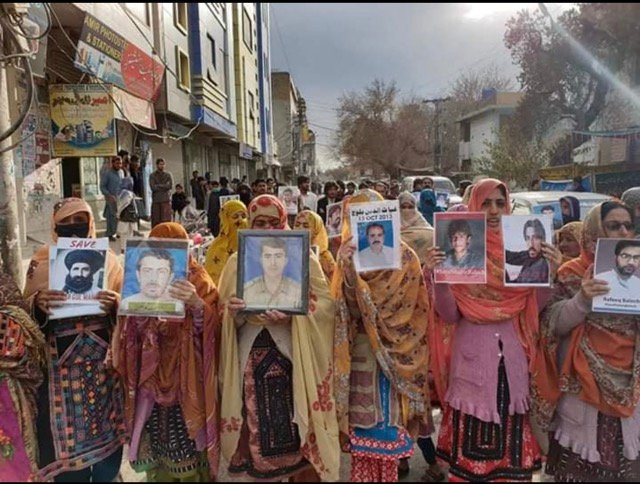Baloch Women, Afghan Children: Victims of the Same Militarised Mindset

Baloch women demonstrate to demand justice for the enforced disappearances of their family members. Photo by @Human Rights Council of Balochistan.
By Kadeem Baloch
Across the barren stretches of Balochistan and the war-scarred valleys of eastern Afghanistan, the cries of the disappeared echo with a chilling similarity. Though separated by a disputed border line, Baloch women and Afghan children are increasingly becoming victims of the same brutal logic — a militarised state machinery that treats entire communities as collateral damage in the name of national security.
In the dusty townships of Kech, Panjgur, and Gwadar, families speak in whispers of sisters, daughters, and mothers taken without warrant or reason. The disappearances of Baloch women, once an unthinkable escalation, have now become disturbingly common. Activists like Seema Baloch and Noor Jahan — known for protesting peacefully against enforced disappearances of their brothers and husbands — have themselves become targets.
Testimonies from families reveal a horrifying trend: women are being picked up as a pressure tactic, to break the resolve of Baloch male activists and fighters. No court orders. No legal representation. Just black-suited men in unmarked vehicles, and silence thereafter. The State, it seems, has decided that even non-combatant women deserve to be punished for demanding dignity and justice.
Afghan Children Under Fire
Meanwhile, across the Durand Line, Pakistani fighter jets scream across the skies of Khost and Paktika. Under the guise of targeting so-called “terror safe havens,” entire villages are flattened, and with them, the futures of Afghan children.
On May 16 this year, a Pakistani airstrike in Paktika killed nine children and three women from the same family. There were no known combatants in the area. The Taliban de facto government has repeatedly condemned these attacks, calling them “unprovoked violations of sovereignty.” Yet, the international community largely remains mute.
The children buried beneath the rubble are not named in any military communique. Their deaths are counted — if at all — as “regrettable collateral.” There are no trials, no accountability, and certainly no justice.
A Common Thread of Impunity
Whether in Turbat or Khost, the common thread is the use of state violence against defenseless populations — with a particular viciousness reserved for women and children. These are not isolated incidents. They form a pattern of governance where fear substitutes for consent, and where militarism displaces dialogue.
Pakistan’s military establishment continues to exert disproportionate control over foreign policy and internal security, often treating dissent — even peaceful — as a threat to national unity. Baloch families who protest outside press clubs in Quetta or Karachi are labelled foreign agents. Afghans who raise concerns about airstrikes are accused of harboring militants.
In both cases, the human cost is immense. Traumatized children, broken families, and generations that grow up mistrusting the very idea of the state.
Perhaps the most troubling aspect is the silence — both within and beyond Pakistan. Domestic media, shackled by censorship and intimidation, rarely covers these issues. International institutions issue tepid statements, wary of upsetting a nuclear-armed state positioned at a geo-strategic crossroads.
Where then do the Baloch mothers and Afghan fathers go to seek justice? Who will count the missing women, or name the children buried in mass graves?
A Call for Accountability
This is not a call for vengeance. It is a plea for accountability. For independent investigations, for humanitarian corridors, for the end of impunity. And above all, for the recognition that security cannot be built upon the broken backs of the vulnerable.
The Pakistani state must abandon this path of militarised governance and instead invest in transparency, reconciliation, and inclusion. The Baloch and Afghan people deserve dignity, not drones.
The author chooses a pseudonym. Kadeem Baloch is a freelance journalist based in Pakistan.
Note: The contents of the article are of sole responsibility of the author. Afghan Diaspora Network will not be responsible for any inaccurate or incorrect statement in the articles.






